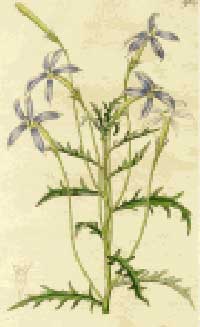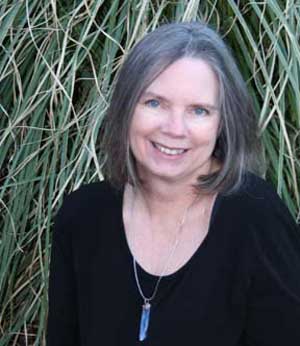Aromatherapy Newsletter Archives
February 2011, V.3, No.2

In this newsletter:
- Aromatherapy Article: The Ancient Roots of Fragrant Medicine
- 2011 Workshop Schedule: Levels I, II & III in Atlanta and Asheville
- Next Aromatherapy Workshop: Level I presented in both Atlanta and Asheville
- Essential Oils: Artisan Aromatics supplies Essential Oils and Aromatherapy Kits
 Check us out of Facebook!
Check us out of Facebook!
The Ancient Roots of Fragrant Medicine

by
Prehistoric Era: Aromatherapy shares a common early history with herbal medicine, of which it is a part. This is a history that extends thousands of years into the prehistoric past and chronicles the ancient relationship between human beings and plants. Archeological evidence from the Shanidar cave burials in Iraq has been interpreted as indicating that Neanderthal people in the area were burying their dead with flowers more than 50,000 years ago. This inference was made from the presence of flower pollen from several species, including yarrow, which was found with the skeletal remains, concentrated around the head. The amount of pollen found for some of the species suggested strongly that whole flowers had been placed in the burial but there has been lively debate in the field of archeology concerning whether or not the pollen might have been carried into the burial by rodents so this oldest evidence for the ritual use of plants remains speculative.
The archeological evidence for prehistoric ritual and medicinal use of plants by humans is fragmentary, especially prior to the Neolithic era (roughly 9000 to 3000 BCE). Most of the plants with the longest documented history of use are psychoactive in nature. In Texas and northeastern Mexico, for example, archeologists have documented a history of psychoactive plant use that extends back to 10,500 years ago. Psychoactive plants have a long history of use in the form of smoke for ritual and medicinal purposes and in this we find the earliest precursor of aromatherapy. In traditional cultures, plant smoke is still widely used in cleansing rituals and is believed to carry messages to the spirit world; this is why Native Americans burn sweet grass and sage, Hindus burn sandalwood, and native South Americans burn palo santo wood. The same belief underlies the burning of frankincense in Catholic churches which has continued into modern times.
Ancient Historic Era: The oldest written records that document the medicinal use of plants come from the ancient Sumerians who lived in Mesopotamia from 5500 BC.
They kept extensive written records on clay tablets that record the plants they used, what they used them for and their methods of preparation and the dosages. Aromatic medicine was highly regarded and pots have been found at Sumerian sites which are believed to have been used for primitive extraction of essential oils. In this method.... Continued on Aromatherapy-School website: The Ancient Roots of Fragrant Medicine
Two-Day Weekend Aromatherapy Workshops in both Asheville and Atlanta

Level I
- Atlanta GA: April 30-May 1
- Asheville NC: May 21-22
- Atlanta GA: June 18-19
- Atlanta GA: August 6-7
- Atlanta GA: September 10-11
Level II
- Atlanta GA: October 1-2
- Asheville NC: October 22-23
Level III
- Atlanta GA: November 12-13
If needed, additional classes may be added in Atlanta / Asheville / Chattanooga in late summer / early fall.
Locations:
Atlanta GA: Staybridge Inn Perimeter near junction of I-285 and Hwy 400 in north Atlanta.
Asheville NC: Specific location not yet set.
Cost for each two-day workshop is $345.00 Early / $395.00 Late (less than 30 days prior)
For more details on available dates and locations click: Register
Aromatherapy Workshop - Level I

Foundations of Aromatherapy for Healing Arts Practitioners
- History of Aromatherapy from Ancient to Modern Times
- Current Status of Aromatherapy as a Professional Practice
- Appropriate Roles and Uses of Aromatherapy as a Complimentary Modality in Healthcare Setting / Staying within Your Legal Scope of Practice when using Essential Oils
- Definitions and Characteristics of Essential Oils and their roles in the Life Processes of Plants / Basics of Essential Oil Chemistry / How Essential Oils are Extracted
- How to Evaluate the Quality of Essential Oils and Why it Matters
- How Essential Oils Enter the Body and React with the Body's Physiology
- Oral Adminsitration and the Role of First-pass Liver Metabolism (for discussion only); oral use is not taught in the course and should not be used by allied health professionals
- Inhalation (extensive discussion of the olfactory system and its connections with the endocrine and immune systems, as well as the effects of inhaled substances on memory and emotional functioning through olfactory connections with the brain's limbic system)
- Topical Application; how avoidance of first-pass liver metabolism affects the delivery of essential oils to organs and tissues of the body
- Methods of Use / Proper Dilution / Safety Issues and Contraindications / How to select a method of use
- In vegetable oils applied to the skin ("spot" application and full body massage)
- Compresses
- Sitz baths / hand and foot soaks
- Baths
- Inhalation and the different methods of presenting essential oils for inhalation
- In-depth profiles of 15 essential oils including
- Discussion of how to use Latin names to insure proper identification of a plant and its oil
- Actions of each oil
- The common uses of each oil in healthcare settings;
- Specific safety data and contraindication for each oil
Essential oils covered in Level I:
Cedarwood | Chamomile, Blue | Chamomile, Roman | Clary Sage | Eucalyptus | Frankincense | Geranium | Lavender | Lemon | Orange, Sweet | Peppermint | Rose | Rosemary | Tea Tree | Ylang Ylang
For more info on the School, Prerequisites, Level II, etc., go to: www.Aromatherapy-School.com
Essential Oils and Aromatherapy Kits

As you probably know, The Aromatherapy School no longer sells essential oils. We've passed that portion of our business on to Artisan Aromatics. They offer all the same quality essential oils from the same sources as we did plus Artisan Aromatics now offers several additional oils with almost one hundred additional ones on the way in the near future.
Artisan Aromatics has created aromatherapy kits exclusively for The Aromatherapy School. Each kit (for Level I and Level II) contains all of the oils that are covered in each level. Students are not required to purchase the kits but, if you are in need of a number of essential oils, Artisan Aromatics has made them available at a discount: 10% off for all Healing Arts Practitioners / 20% off for all current and former students of The Aromatherapy School.
All of the Essential Oils in the Level I and Level II Essential Oil Kits are Therapeutic Quality. Some of the Essential Oils come from Artisan Aromatics' Artisan collection and the remainder of the Essential Oils come from their Therapeutic collection. These Essential Oil Kits are designed to specifically meet the requirements for The Aromatherapy School's Level I and Level II Aromatherapy Workshops but, of course, the kits also make great starter kits for anyone.
Artisan Aromatics
Finally, if this newsletter is just not "your cup of tea", we'd appreciate it if you would forward this email on to friends and family who might be interested. Please let them know that they can subscribe to our mailing list and receive future updates and newsletters by visiting our website: www.aromatherapy-school.com
Thanks for your time. We will strive to bring you even more informative newsletters in the future. Your feedback is important to us so please let us know if you feel that changes should be made in content or format and if there are any topics that you'd like us to cover.
Sincerely,
Joie Power, Ph.D., Dir.
The Aromatherapy School
www.aromatherapy-school.com
| |
| |
To Read other Newsletters from The Aromatherapy School, click: Aromatherapy Newsletter List
Dr. Power is a retired board certified neuropsychologist and former Assistant Professor of Surgery/Neurosurgery at the Medical College of Georgia, where she performed intra-operative cortical mapping with renowned neurosurgeon Herman Flanigan, M.D. She has over 20 years of clinical experience in both in-patient and out-patient settings and during her years of practice has also been both a practitioner and student of alternative healing methods, including herbal medicine, aromatherapy, Reiki, Chinese Medicine, and other energetic healing systems. Her extensive formal training and experience in the olfactory and limbic systems of the brain give her a unique qualification for understanding the actions of essential oils in the body. Dr. Power, founder of one of the earliest essential oil companies in the U.S. to specialize in therapeutic quality essential oils, is now a clinical consultant for Artisan Aromatics as well as an internationally known writer and teacher in the fields of aromatherapy and alternative medicine. Her approach to aromatherapy weaves together her solid scientific training and strong clinical skills with a holistic philosophy that honors body, mind and spirit. Dr. Joie Power is also the author of The Quick Study Guide to Aromatherapy and numerous published articles on aromatherapy and related topics.
Want to keep up with what's going on at The Aromatherapy School and receive interesting articles on Aromatherapy and Essential Oils?
Sign up for The Aromatherapy School Newsletter: Subscribe
Home |
Contact us |
Next Workshop |
About |
Consult Services |
FAQ |
Policies |
Links |
Prerequisites |
Workshop Schedule |
Checkout |
Aromatherapy Articles |
Aromatherapy Newsletters |
Enfleurage |
Essential Oils & Aromatherapy Products |
CEs |
Site Map by xml-sitemaps.com |
We Recommend Artisan Aromatic's Essential Oils |
Online Aromatherapy Courses

|

|